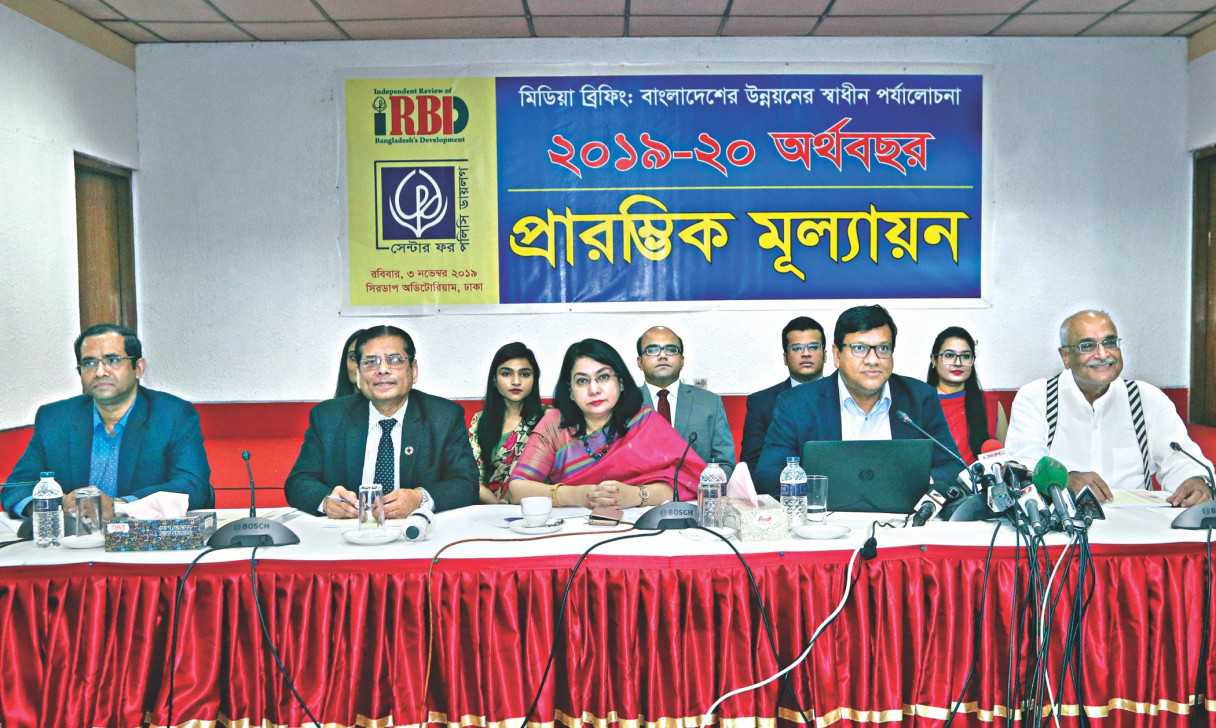Not fund crisis, poor governance depresses stocks: CPD

Image collected
Fund crisis is not the main problem for the capital market but lack of good governance and structural weaknesses of institutions are, the Centre for Policy Dialogue (CPD) said yesterday.
The CPD identified five issues that are weakening the markets: poor-quality initial public offerings (IPO), anomalies in financial reporting, lack of transparency in beneficiary owner’s (BO) accounts, suspicious trading in secondary market and questionable role of institutional investors.
The lack of good governance and structural institutionalisation is fuelling a crisis in the stock market, so when the government provides liquidity support the index rises temporarily but not for long, said Khondaker Golam Moazzem, research director of the CPD.
His comments came at the unveiling of its report ‘State of the Bangladesh Economy in FY2019-20’, at the Cirdap Auditorium in Dhaka.
Whenever stocks plunge some people blame the liquidity crisis and seek support from the government and the government also takes such measures, Moazzem said.
“But liquidity crisis is not the reason for the market’s slide.”
However, a permanent or sustainable solution from the government never comes by, so the stock market is still suffering, he said.
The market became unstable after the last national polls despite a number of promises in the election manifesto.
Many listed companies’ dividends fell and some failed to provide any dividend also.
On the other hand, junk stocks were jumping abnormally, but no effective steps were taken against them from the regulator, he pointed out.
“Institutional investors are behaving like silent audience. On the other hand, higher bad loans and lack of corporate good governance mounted the crisis of confidence.”
Institutional investors’ transactions sometimes create instability in the market. As institutional investors hold almost 60 percent of the shares in the market, they need to behave in a stable manner.
“Otherwise, the market will not be stable. We are not seeing responsible market behaviour in the market.”
Crisis between Grameenphone and the Bangladesh Telecommunication Regulatory Commission was also a reason of the market’s slide.
About the lack of quality IPOs, Moazzem said a number of IPOs have been approved by the BSEC whose stock price rose in the first few days and then plummeted to a very low level. Sometimes they went below the offer price.
So, it raises the question of what kind of companies they are and whether they were properly scrutinised by the Dhaka Stock Exchange, Chittagong Stock Exchange and the BSEC.
However, Tk 220 crore has been raised by many companies in the current year, so the IPO process should be well monitored and transparent, Moazzem said.
About the financial reporting of listed companies, the researcher said there are many anomalies in financial reports of listed companies, so the BSEC’s auditor panel should be well-drafted such that only good auditors can get the chance to audit listed companies.
He recommends assessing the financial reports through a third party, which can be the Financial Reporting Council (FRC).
Moazzem recommends bringing transparency in the opening of BO accounts. The total number of BO accounts is more than 66 lakh, but about 27 lakh are active.
The secondary market has been witnessing suspicious trading, too. For instance, many ‘Z’ category shares take place surprisingly in the top gainers’ list.
“How can a company bag a place in the list when it fails to provide dividend or hold annual general meetings?”
Overall, the CPD’s suggestion was to increase investment in the market, be strict with market surveillance, ensure a strong bond market, get the Chinese investors to meet their commitments, strengthen the role of central depository of Bangladesh and implement laws.
Source: https://www.thedailystar.net
Tags :
Previous Story
- CPD to dispatch BD Business Environment Study
- Experts see enormous prospects in Belt and Road...
- Economy under stress: CPD
- SANEM questions Bangladesh GDP growth forecast for fiscal...
- Bangladesh shows impressive GDP growth but inequalities are...
- CPD: Bangladesh must focus on investment, export diversification
- May Day: Do we need to recognize unpaid...
- Half of industrial loan defaulted in Bangladesh